Gig venues turn climate change fight up to 11
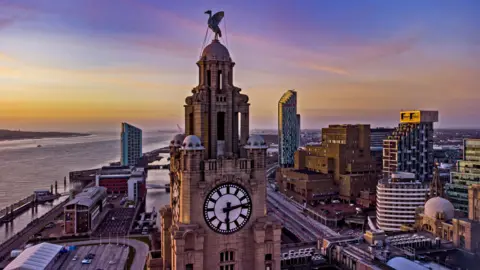 PA Media
PA MediaBillie Eilish, Radiohead, Coldplay - the list of musicians and bands saying they are trying to reduce their environmental impact is a long and ever-growing one.
But what about the venues where they play - what can they really do to help when they are so reliant upon the energy that powers their lights, amps and speakers?
Some of Liverpool's live music spaces are turning the fight against climate change up to 11, to borrow a phrase from the classic rock mockumentary Spinal Tap.
And there is a hope some big gigs this weekend will really help to show the world how to start decarbonising the industry.
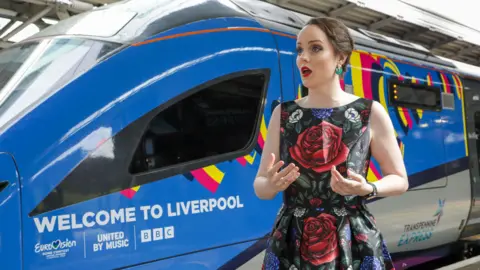 PA Media
PA MediaFuture Yard in Birkenhead is already trying to reduce its carbon footprint.
It uses renewable energy, there is no meat on food menus, and touring bands can take advantage of the venue's "plug and play" scheme to borrow instruments.
This gives musicians the choice to use public transport rather than constantly lugging their gear around the country in vans, coaches and trucks.
James Gillaspy said his venue could supply drums, amps, microphones and other equipment so many bands only have to bring their guitars and drumsticks.
He said this made it "easier for them to walk or get the bus, especially if they are local".
As a result of "plug and play", Mr Gillaspy said Future Yard had seen a 25% increase in the number of local artists using public transport.
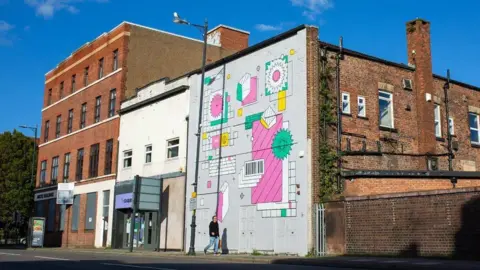 ROBIN CLEWLEY
ROBIN CLEWLEYLast year, Future Yard campaigned successfully to bring back night buses connecting Birkenhead and Liverpool.
Mr Gillaspy said getting bands out of their traditional transit vans and persuading them to instead take the bus or train could change the face of touring.
“If every single music venue did this, we could eventually be in a situation where bands could do entire tours on public transport," he said.
More transport options would also help music fans do their bit for the environment, said Mr Gillaspy, mentioning that nearly half of gig goers get to Future Yard used public transport.
While world leaders met in Azerbijan earlier this month for the COP29 climate change conference, Future Yard hosted POP29 and asked: "Can the music industry be more sustainable?"
While Mr Gillaspy said he knew it sometimes costs more to do things differently, now was the "time to be bold".
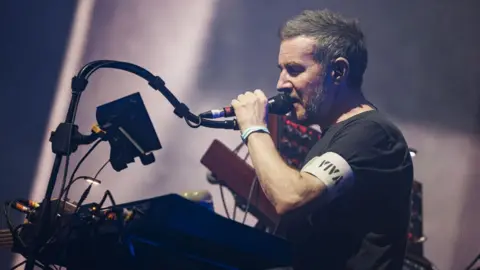 EPA
EPASince Thursday, Liverpool's M&S Bank Arena has been hosting Act 1.5 presents.
Massive Attack and IDLES have already taken to the stage.
Chic featuring Nile Rodgers concludes the three-day series of events later.
Act 1.5 is a reference to a 2015 international agreement to try to limit global warming to 1.5C above the levels seen in pre-industrial times.
Robert Del Naja, from trip hop collective Massive Attack, said the band's recent show in Bristol - billed as the lowest-carbon concert of its size that had ever been staged - proved the music industry could do its bit.
Liverpool was recently announced by a United Nations programme as the world's first "Accelerator City" for taking action to combat climate change.
Del Naja said UN recognition would lead to more "dynamic pilots and experiments to rapidly phase out fossil fuels".
He added: "This idea and this insistence are not going back in any box.
"We’re delighted to see artists like Coldplay testing elements like localised ticket pre-sales as recommended in the Tyndall Centre Paris 1.5 decarbonisation road map and encourage other artists to do so freely."
Liverpool city council leader Liam Robinson was invited to address COP29 about the city’s plans.
While he conceded it might be a tough ask, he pledged to work closely with smaller venues in the city.
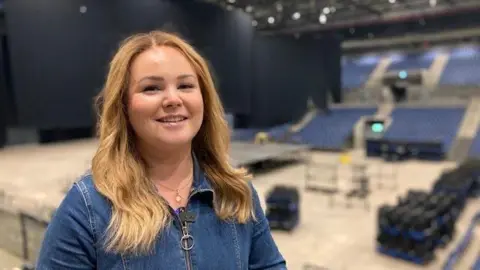
Rhiannon Newman from Culture Liverpool, the cultural arm of the city council, said next weekends shows would be "a low carbon example of how gigs can be delivered".
"It’s essentially an experiment," she said. "But it won’t feel like an experiment to the audience."
She agreed with Mr Gillaspy that promoting public transport was key to reducing carbon emissions.
To enable music fans to catch the last train home or get the bus rather than drive, the shows will start and finish earlier than usual.
Those wanting to eat at the venue will find plant-based menus.
Packaging and waste will be kept to a minimum, with recycling heavily promoted.
The overall aim, said Ms Newman, was to work out a greener blueprint for gigs in her city and beyond.
Her attitude?
“Liverpool always believes that what hasn’t already been done, can be done!"
This article was first published on 24 November 2024.
Listen to the best of BBC Radio Merseyside on Sounds and follow BBC Merseyside on Facebook, X, and Instagram. You can also send story ideas to [email protected] and via Whatsapp to 0808 100 2230.
